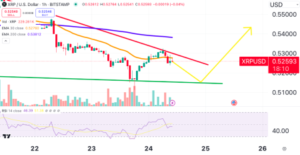Last updated:
 Why Trust Cryptonews
Why Trust Cryptonews

Prosecutors in the case against former FTX executive Nishad Singh are urging the judge to consider his “substantial assistance” and “exemplary cooperation” when determining his sentence.
In a document submitted on October 23, government attorneys praised Singh for his remorse and willingness to aid investigations, highlighting how he helped clarify FTX’s misuse of customer funds.
They said Singh’s cooperation also revealed key details about Sam Bankman-Fried’s fraudulent activities, including a major campaign finance scheme and manipulation of FTX’s financial records to inflate revenue.
Singh’s Assistance Was Crucial in FTX Case
Prosecutors noted that without Singh’s assistance, some of this information may never have come to light.
Singh, the former head of engineering at FTX, pleaded guilty to six criminal charges, including fraud and conspiracy, in February 2023, following FTX’s collapse in November 2022.
His legal team has requested leniency, citing Singh’s limited role at the company and his willingness to cooperate with the authorities.
Singh, alongside FTX’s former chief technology officer Gary Wang, is still awaiting sentencing.
Bankman-Fried, the founder of FTX, was sentenced to 25 years in prison earlier this year on fraud and conspiracy charges.
Meanwhile, other key figures in the FTX saga have also faced sentencing.
Caroline Ellison, former CEO of Alameda Research, received two years in prison, and Ryan Salame, CEO of FTX Digital Markets, is serving a 7.5-year sentence after pleading guilty to charges related to unlicensed money transmission and election fraud.
Last week, lawyers for Singh filed a request with the U.S. Southern District of New York, seeking no prison time for their client.
Singh’s legal team argued that his involvement in the FTX collapse was limited compared to others.
“His role was far more limited than any other defendant. He does not minimize his conduct; he pled guilty to serious crimes at the outset of this case and will regret his actions for the rest of his life,” the filing stated.
The lawyers emphasized that Singh only became part of the conspiracy involving FTX customer funds in September 2022, just two months before the exchange’s collapse.
SBF’s Neurodivergence Disorders Impacted Trial
Last month, a group of doctors submitted an amicus brief in support of Sam Bankman-Fried’s appeal, claiming that his criminal trial may have been significantly affected by his neurodivergence disorders.
The FTX co-founder, who has been diagnosed with autism spectrum disorder (ASD) and attention-deficit/hyperactivity disorder (ADHD), faced “serious challenges” during the court proceedings, the doctors said.
The brief, signed by eight doctors specializing in neurodivergence, highlighted that several rulings during the trial were detrimental to Bankman-Fried due to his conditions.
The amicus brief also coincided with another filing by a group of bankruptcy law professors who expressed concerns about the intersection of FTX’s bankruptcy case and Bankman-Fried’s criminal trial.
Although they did not take a stance supporting either side, the professors argued that the cooperation between the FTX bankruptcy estate and the prosecution could set a “dangerous precedent,” encouraging the use of Chapter 11 proceedings to bolster parallel criminal prosecutions.















